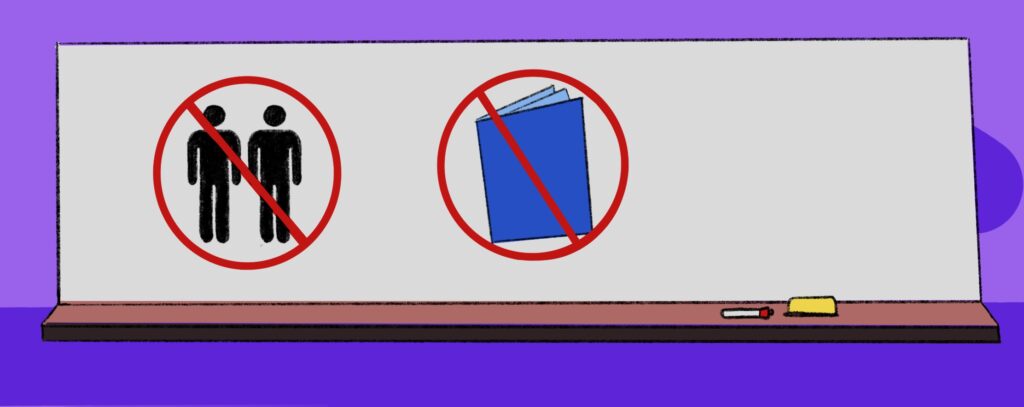
Far too many adults are keeping their children from important education with movements to ban books, history lessons and the mere mention of same-sex relationships.
Last year, I attended presentation about the history of lynching. Some students remarked that they had never learned about the topic in depth before. The presenter then asked us whether younger teenagers should learn about something as intense and gruesome as lynching. Almost every attendee said no.
I was the dissenter in the room, and it stunned me to hear legal adults say that high schoolers are not mature enough to learn about our nation’s history. Some even said that high schoolers were not informed enough to discuss such a topic. The irony. How are people supposed to become informed if not through discussion in school?
Unfortunately, this sentiment is not rare. As someone who splits her time between Big Rapids and Florida, I have seen a fair share of adults call educational censorship “parents’ rights.”
There is a continuing sad saga that takes place in Jamestown, located south of Grand Rapids. A millage to fund Patmos Library failed for the second time in this November’s midterm elections. Without this crucial taxpayer funding, the public library’s future looks grim. This decades-old library may close because its Jamestown residents wanted to ban the book “Genderqueer: A Memoir,” and the librarians refused.
“Our tax dollars should never be spent [on] grooming children,” Donna Rotman of Jamestown said at a board meeting. “The content in some of the books contains graphic sexual dialogue and narratives. No child has an innate sense of being genderqueer or gender fluid. It is manipulative, destructive and wrong. A library that pushes this agenda is disrespectful.”
“Genderqueer: A Memoir” is the most banned book in the country. While Patmos librarians agreed to keep the book behind the counter and only check it out to patrons who specifically ask for it, that still was not enough to keep its doors open indefinitely. This story is bigger than Jamestown. PEN America reports that 41% of books banned across the country contain LGBT+ themes and 40% contain prominent characters of color. American citizens are voting against public education.
To focus more closely on schools, I will explain the restrictions my mom faces as a first-grade teacher in Florida. Gov. Ron DeSantis signed the “Parental Rights in Education” bill in March.
“Classroom instruction by school personnel or third parties in sexual orientation or gender identity may not occur in kindergarten through grade three or in a manner that is not age-appropriate…” the bill reads.
The state legislature vetoed an amendment that would define “sexual orientation” and “gender identity” in the bill. Might I add that “age appropriate” is also vague, up to the interpretation of lawmakers that hardly ever speak with members of the LGBT+ community. Teachers have been warned against wearing clothing that may spark conversation about LGBT+ matters, prompting the bill’s colloquial title of “Don’t Say Gay.”
Last week, a federal judge blocked Florida’s “dystopian” Individual Freedom Act in universities. The act was previously known as the Stop W.O.K.E. Act, “WOKE” standing for “wrongs to our kids and employees.” The bill prohibits any instruction in schools or workplaces that supports the following ideas:
“An individual’s moral character or status as either privileged or oppressed is necessarily determined by his or her race, color, sex, or national origin.”
“An individual should feel discomfort, guilt, anguish, or any other form of psychological distress on account of his or her race, color, sex, or national origin.”
This bill aims to make the mention of racial and sexual oppression illegal because of the mere “discomfort” that white people, straight people and men may feel when they learn American history. It is not the state’s job to ensure that white people never feel bad for racism.
Similar laws banning racial history and discussion of human sexuality are being passed across the country. They masquerade as armor to protect Americans from dreaded critical thinking. As a journalist and scholar of history, I understand that some stories are hard to hear. My classes have exposed me to wartime images that deeply disturb me. If we turn our backs on history or politics that make us uncomfortable, our education will dissolve like the funding of Patmos Library.
